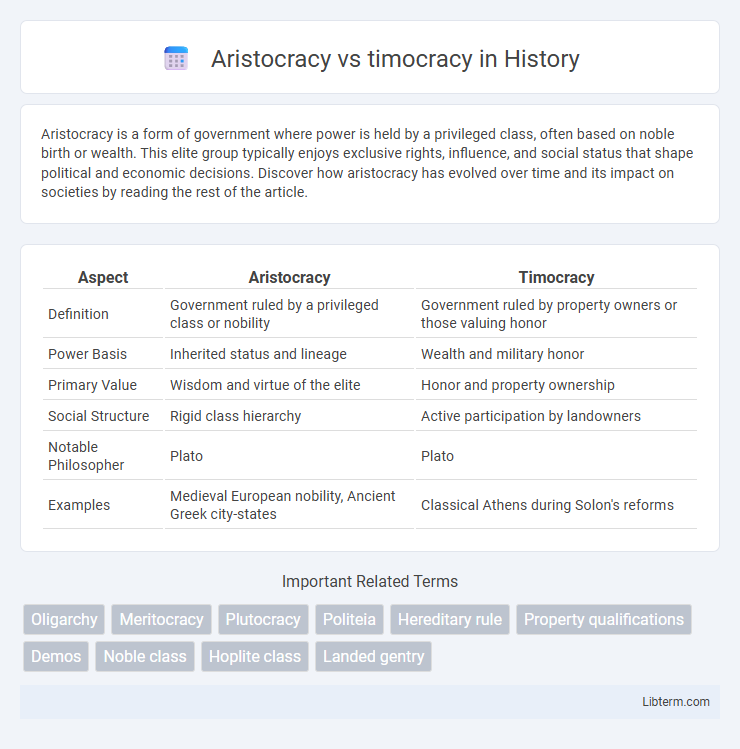Aristocracy is a form of government where power is held by a privileged class, often based on noble birth or wealth. This elite group typically enjoys exclusive rights, influence, and social status that shape political and economic decisions. Discover how aristocracy has evolved over time and its impact on societies by reading the rest of the article.
Table of Comparison
| Aspect | Aristocracy | Timocracy |
|---|---|---|
| Definition | Government ruled by a privileged class or nobility | Government ruled by property owners or those valuing honor |
| Power Basis | Inherited status and lineage | Wealth and military honor |
| Primary Value | Wisdom and virtue of the elite | Honor and property ownership |
| Social Structure | Rigid class hierarchy | Active participation by landowners |
| Notable Philosopher | Plato | Plato |
| Examples | Medieval European nobility, Ancient Greek city-states | Classical Athens during Solon's reforms |
Introduction to Aristocracy and Timocracy
Aristocracy is a form of government where power is held by a privileged ruling class, often characterized by hereditary nobility and emphasis on virtue and wisdom. Timocracy, in contrast, is a system where political influence depends on property ownership or military achievement, prioritizing honor and wealth as qualifications for leadership. Both systems reflect distinct approaches to governance based on social hierarchy and value systems.
Defining Aristocracy: Rule by the Elite
Aristocracy is a form of government where power is concentrated in the hands of a privileged elite, typically determined by birth, wealth, or social status. This ruling class holds authority based on inherited privilege and often claims to govern for the benefit of society through their superior wisdom and virtue. Unlike timocracy, which values property ownership and military service as qualifications for rule, aristocracy prioritizes lineage and established social hierarchy as the foundation for political power.
Understanding Timocracy: Governance by Property Holders
Timocracy is a form of governance where political power is granted based on property ownership, emphasizing the role of wealth and land as qualifications for leadership. Unlike aristocracy, which is typically defined by noble lineage and hereditary titles, timocracy prioritizes economic status and civic responsibility tied to material assets. This system aims to balance governance by incentivizing property holders to act in the community's interest while maintaining social order through wealth-based participation.
Historical Origins of Aristocracy
Aristocracy originated in ancient Greece as a form of government where power was held by a privileged class of nobles, distinguished by hereditary titles and land ownership. This ruling elite claimed authority based on lineage, wealth, and military leadership, contrasting with timocracy, which shifted power to those with property and military service rather than noble birth. The historic development of aristocracy laid the groundwork for feudal systems in medieval Europe, where social hierarchy and political control remained concentrated in the hands of aristocratic families.
Timocracy in Ancient Civilizations
Timocracy in ancient civilizations, such as those in Athens and Sparta, was a government system where political power was tied to property ownership or military service. This form of rule emphasized honor and duty, granting influence to citizens who contributed to the state's defense or possessed substantial land, distinguishing it from aristocracy, where power was inherited by elite noble families. Timocratic societies prioritized merit and wealth generation, fostering a governance structure that balanced personal achievement with civic responsibility.
Key Differences: Aristocracy vs Timocracy
Aristocracy is a form of government where power is held by a privileged, hereditary ruling class distinguished by noble lineage and wealth, emphasizing inherited status and governance by the elite. Timocracy, contrastingly, bases political power on property ownership or military service, rewarding citizens with material or martial merit rather than birthright. The key difference lies in aristocracy's focus on noble birth and social hierarchy, whereas timocracy prioritizes civic virtue linked to economic wealth or warrior status.
Social Hierarchies and Class Structures
Aristocracy features a social hierarchy dominated by hereditary nobility, where political power and social status are inherited, reinforcing a rigid class structure based on lineage and land ownership. Timocracy, by contrast, organizes society around property ownership and military service, placing wealth and honor as key criteria for social rank rather than birthright. This system creates a social class distinguished by individuals who possess a certain amount of property and demonstrate civic virtue, fostering a more merit-based aristocratic class compared to the hereditary aristocracy.
Philosophical Perspectives: Plato and Aristotle
Plato defined aristocracy as the ideal state ruled by philosopher-kings who govern based on wisdom and justice, while timocracy is characterized by rule driven by honor and ambition, often leading to eventual decline. Aristotle contrasted these by viewing aristocracy as a virtuous form of government serving the common good, whereas timocracy represented a flawed, mixed constitution dominated by property owners and military valor. Both philosophers analyzed these systems in the context of political stability, moral virtue, and the role of reason versus passion in leadership.
Influence on Modern Political Systems
Aristocracy, characterized by rule of a privileged elite, has influenced modern political systems through the establishment of hereditary leadership and class-based governance seen in constitutional monarchies. Timocracy, defined by rule based on property ownership or military capacity, has shaped democratic elements by emphasizing citizen participation tied to wealth or service, evident in early republics like ancient Athens. Both systems contribute foundational ideas about governance structures, social stratification, and civic responsibility impacting contemporary political theory and practice.
Conclusion: Relevance in Contemporary Society
Aristocracy and timocracy represent distinct governance models rooted in power concentration by elite individuals, with aristocracy based on hereditary privilege and timocracy emphasizing property ownership as a basis for political influence. In contemporary society, aristocratic elements persist in political dynasties and elite networks, while timocratic principles appear in systems where wealth significantly impacts political participation and policymaking. Understanding these frameworks aids in analyzing modern challenges of inequality and civic engagement within democratic institutions.
Aristocracy Infographic

 libterm.com
libterm.com